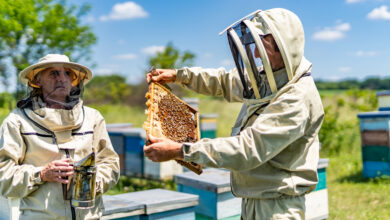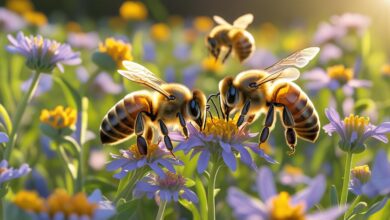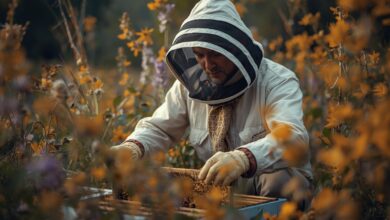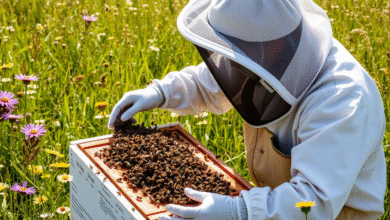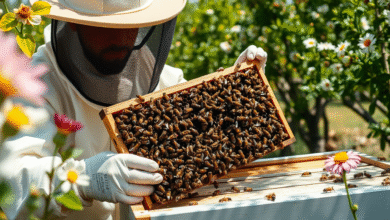Sabedoria Apícola O que Veterans Ensina Novatos
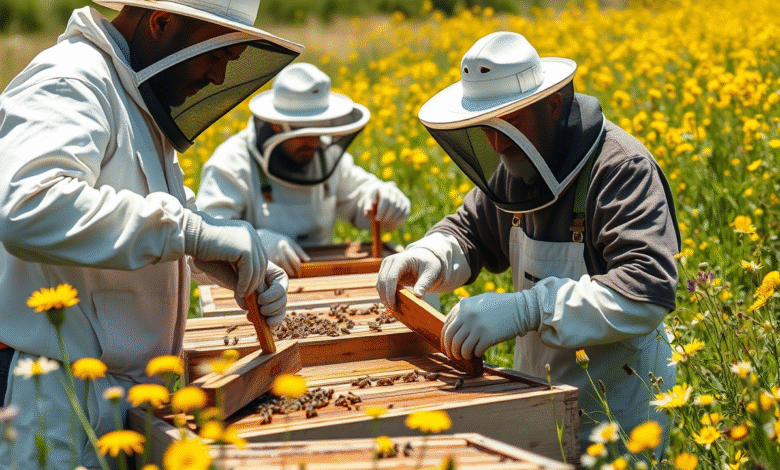
Você já sonhou em ter suas próprias colmeias? Talvez você já tenha algumas abelhas, mas sente que ainda há muito para aprender? Então você está no lugar certo! Hoje vamos conversar sobre os segredos que só os apicultores mais experientes conhecem.
A apicultura é uma arte antiga. É também uma ciência cheia de surpresas. Quando você começa a criar abelhas, parece tudo muito complicado. Mas com o tempo, você descobre que as abelhas são suas melhores professoras. Elas ensinam paciência, observação e respeito pela natureza.
Os apicultores experientes sabem que cada colmeia tem sua personalidade. Algumas são mais calmas, outras mais agitadas. Algumas produzem muito mel, outras preferem cuidar das crias. E é exatamente essa diversidade que torna a apicultura tão fascinante.
Neste artigo, você vai aprender dicas valiosas que levaram anos para serem descobertas. São truques simples, mas poderosos. São segredos que podem fazer a diferença entre uma colmeia próspera e uma que luta para sobreviver.
Como os Apicultores Experientes Escolhem o Local Perfeito
O local onde você coloca suas colmeias é como escolher uma casa para sua família. Precisa ser seguro, confortável e ter tudo que elas precisam por perto.
A Importância do Sol da Manhã
As abelhas adoram o sol da manhã. É como um café da manhã energizante para elas. Coloque suas colmeias onde recebam o primeiro sol do dia. Isso as ajuda a acordar cedo e começar o trabalho.
Mas cuidado com o sol forte da tarde. Em dias muito quentes, as abelhas ficam estressadas. É como ficar dentro de um carro fechado no verão. Por isso, uma sombra leve à tarde é sempre bem-vinda.
Proteção Contra Ventos Fortes
O vento pode ser amigo ou inimigo das abelhas. Uma brisa suave ajuda a ventilar a colmeia. Mas ventos fortes podem derrubar as colmeias ou dificultar o voo das abelhas.
Procure um local protegido por árvores ou construções. Imagine suas abelhas como pessoas caminhando com guarda-chuvas em dia de ventania. Elas precisam de abrigo para trabalhar em paz.
Água Limpa e Acessível
As abelhas precisam de água para tudo. Para fazer mel, para resfriar a colmeia, para alimentar as larvas. É como ter uma torneira sempre aberta em casa.
Coloque um bebedouro perto das colmeias. Pode ser uma bacia com pedrinhas dentro. As pedrinhas servem como pequenas ilhas onde as abelhas podem pousar para beber. Sem as pedrinhas, elas podem se afogar.
Os Segredos da Inspeção que Todo Apicultor Experiente Conhece
Inspecionar colmeias é como fazer uma consulta médica. Você precisa observar, escutar e sentir o que está acontecendo.
O Momento Certo para Abrir a Colmeia
Nunca abra uma colmeia em dia chuvoso ou muito frio. As abelhas ficam irritadas quando o tempo está ruim. É como acordar alguém de mau humor.
O melhor momento é em dias ensolarados, entre 10h e 15h. Nesse horário, as abelhas trabalhadoras estão no campo coletando néctar. Sobram menos abelhas na colmeia, tornando a inspeção mais tranquila.
Como Observar Sem Incomodar
Movimentos lentos e suaves são a chave. Imagine que você está numa biblioteca silenciosa. Cada movimento brusco pode causar alarme.
Use sempre o fumigador. A fumaça acalma as abelhas porque elas pensam que há um incêndio. Instintivamente, elas se preparam para evacuar, enchendo o estômago de mel. Abelhas com estômago cheio são mais calmas.
Sinais de Uma Colmeia Saudável
Uma colmeia saudável tem cheiro doce e movimento constante. Você deve ver abelhas entrando com pólen nas pernas. O pólen parece pequenas bolinhas coloridas grudadas nas pernas traseiras.
Escute também o som da colmeia. Uma colmeia saudável faz um zumbido constante e suave. Se o som estiver muito alto ou muito baixo, pode haver problemas.
Alimentação Suplementar: Quando e Como Fazer
Às vezes, mesmo a natureza mais generosa não oferece alimento suficiente. Em períodos de seca ou frio intenso, suas abelhas podem precisar de ajuda extra.
Xarope de Açúcar: A Receita dos Mestres
A receita básica é simples: uma parte de açúcar para uma parte de água. Ferva a água, dissolva o açúcar e deixe esfriar completamente antes de oferecer.
No outono e inverno, use duas partes de açúcar para uma de água. Esse xarope mais concentrado simula o mel e ajuda as abelhas a estocar energia para os dias frios.
Alimentadores Que Realmente Funcionam
Existem vários tipos de alimentadores. O importante é escolher um que não permita que as abelhas se afoguem. Alimentadores tipo “Boardman” são práticos para iniciantes.
Coloque sempre o alimentador dentro da colmeia ou muito perto dela. Se colocar longe, você pode atrair abelhas de outras colmeias, causando brigas.
Sinais de Que Suas Abelhas Precisam de Alimentação
Abelhas famintas ficam agitadas e agressivas. Elas podem tentar roubar alimento de outras colmeias. Se você notar movimento estranho ao redor das colmeias, pode ser sinal de fome.
Outro sinal é a diminuição no movimento. Abelhas bem alimentadas são ativas. Se sua colmeia está muito quieta em dias bons, verifique os estoques de alimento.
Manejo de Pragas e Doenças de Forma Natural
As abelhas têm inimigos naturais. Mas você pode ajudá-las a se defender sem usar produtos químicos agressivos.
O Ácaro Varroa: O Maior Desafio
O ácaro varroa é como um vampiro microscópico que suga o sangue das abelhas. É o problema mais sério que apicultores enfrentam hoje.
Uma técnica natural é usar telas no fundo da colmeia. Quando os ácaros caem, eles não conseguem subir de volta. É uma armadilha simples e eficaz.
Formigas: Prevenção é Melhor que Tratamento
Formigas adoram mel e podem invadir colmeias fracas. Para evitá-las, coloque as pernas do suporte das colmeias dentro de recipientes com água. É como criar um fosso ao redor de um castelo.
Você também pode usar vaselina nas pernas do suporte. As formigas não conseguem subir em superfícies escorregadias.
Traças da Cera: Como Evitar a Invasão
Traças da cera atacam colmeias fracas ou quadros armazenados incorretamente. A melhor defesa é manter colmeias fortes. Abelhas saudáveis expulsam as traças naturalmente.
Para quadros armazenados, use folhas de louro. O cheiro forte afasta as traças sem prejudicar a cera. É um truque antigo que ainda funciona perfeitamente.
A Arte de Multiplicar Colmeias
Expandir seu apiário é emocionante. Mas fazer isso corretamente requer conhecimento e paciência.
Quando Dividir uma Colmeia
O melhor momento para divisão é na primavera, quando há muito néctar disponível. A colmeia mãe deve estar forte, com pelo menos 8 quadros cobertos de abelhas.
Procure sinais de que a colmeia quer enxamear. Células reais (onde nascem as rainhas) na parte inferior dos quadros são um sinal claro.
Como Fazer uma Divisão Segura
Pegue 3-4 quadros com cria e abelhas da colmeia mãe. Inclua pelo menos um quadro com ovos bem pequenos. As abelhas podem criar uma nova rainha a partir desses ovos.
Coloque os quadros em uma nova colmeia com quadros vazios. Adicione um alimentador com xarope. A nova colônia precisará de energia extra para se estabelecer.
Cuidados com a Nova Colônia
Nos primeiros 30 dias, visite a nova colmeia semanalmente. Verifique se há sinais de que uma nova rainha nasceu e está botando ovos.
Se após 3 semanas não houver sinais de rainha, você pode introduzir uma rainha comprada ou unir a colônia de volta com a original.
Produção e Colheita de Mel de Qualidade
O mel é a recompensa mais doce da apicultura. Mas produzir mel de qualidade requer atenção aos detalhes.
Quando Colher o Mel
Nunca tenha pressa para colher mel. Mel maduro tem menos de 18% de umidade. Mel com muita água pode fermentar e estragar.
Colha apenas quadros com pelo menos 80% das células operculadas (fechadas com cera). Essas células contêm mel maduro e pronto para consumo.
Técnicas de Extração
Se você tem poucas colmeias, pode extrair mel manualmente. Corte pequenos pedaços de favo e deixe escorrer em peneiras finas.
Para quantidades maiores, um extrator centrífugo é essencial. Mas mesmo com equipamentos, a paciência é fundamental. Mel de qualidade não pode ser apressado.
Armazenamento Correto
Mel puro nunca estraga, mas pode cristalizar. Isso é normal e não afeta a qualidade. Para manter o mel líquido, armazene em local com temperatura constante.
Use recipientes de vidro ou plástico próprio para alimentos. Nunca use metal, pois pode alterar o sabor do mel.
Preparação para o Inverno
O inverno é a época mais crítica para as abelhas. Uma boa preparação pode significar a diferença entre vida e morte da colônia.
Redução do Espaço
No final do outono, remova quadros vazios. Abelhas em espaços menores conseguem manter melhor a temperatura. É como usar um cobertor mais apertado no frio.
Deixe apenas os quadros necessários para a população de abelhas. Uma regra prática é um quadro para cada mil abelhas.
Verificação dos Estoques
Cada colmeia precisa de pelo menos 15-20 kg de mel para passar o inverno. Se não houver estoque suficiente, comece a alimentação suplementar antes do frio chegar.
Verifique também se há quadros com pólen estocado. Pólen é a proteína que as abelhas precisam para alimentar as crias na primavera.
Proteção contra Vento e Umidade
Coloque quebra-ventos ao redor das colmeias. Pode ser lona, madeira ou até mesmo fardos de feno. O importante é reduzir a corrente de ar frio.
Certifique-se de que há ventilação adequada na parte superior da colmeia. Umidade excessiva é mais perigosa que o frio para as abelhas.
Registros e Documentação: A Memória do Apicultor
Apicultores experientes sempre mantêm registros detalhados. A memória pode falhar, mas os registros não mentem.
O Que Anotar
Anote a data de cada inspeção, condições climáticas, comportamento das abelhas, quantidade de cria e presença da rainha. Esses dados ajudam a identificar padrões e problemas.
Registre também tratamentos aplicados, alimentação fornecida e colheitas realizadas. Essas informações são valiosas para planejar ações futuras.
Como Organizar as Informações
Use um caderno simples ou aplicativo no celular. O importante é ser consistente. Desenvolva um sistema de símbolos ou abreviações para agilizar as anotações.
Faça desenhos quando necessário. Às vezes, um desenho simples da posição dos quadros vale mais que muitas palavras.
Análise dos Dados
Revise seus registros periodicamente. Procure padrões como épocas de maior produção, períodos de enxameação ou incidência de doenças.
Essas análises ajudam a tomar decisões mais acertadas e a prever problemas antes que aconteçam.
Relacionamento com a Comunidade Apícola
A apicultura é mais rica quando compartilhada. Conectar-se com outros apicultores traz benefícios mútuos.
Participação em Associações
Associações de apicultores são fontes valiosas de conhecimento. Participar de reuniões e eventos ajuda a aprender técnicas novas e a resolver problemas comuns.
Muitas associações oferecem cursos, palestras e até equipamentos compartilhados. É uma forma econômica de crescer na atividade.
Troca de Experiências
Cada apiário é único. O que funciona em um local pode não funcionar em outro. Trocar experiências com outros apicultores amplia sua visão e suas possibilidades.
Não tenha vergonha de fazer perguntas. Apicultores experientes geralmente adoram compartilhar conhecimento com iniciantes entusiasmados.
Mentoria e Ensino
Quando você ganhar experiência, considere ensinar outros iniciantes. Ensinar é uma das melhores formas de consolidar seu próprio conhecimento.
Além disso, formar novos apicultores fortalece toda a comunidade e contribui para a conservação das abelhas.
Inovações e Tecnologias Modernas
A apicultura tradicional continua válida, mas algumas inovações podem facilitar o trabalho.
Colmeias de Observação
Colmeias com paredes de vidro permitem observar as abelhas sem perturbá-las. São excelentes ferramentas de aprendizado, especialmente para iniciantes.
Você pode ver como as abelhas constroem favos, como cuidam das crias e como se comportam dentro da colmeia.
Alimentadores Automáticos
Sistemas de alimentação automática podem facilitar o manejo em apiários grandes. Mas para iniciantes, a alimentação manual oferece mais oportunidades de observação e aprendizado.
Monitoramento Eletrônico
Existem sensores que monitoram peso, temperatura e umidade das colmeias. Essas informações podem ser acessadas remotamente via aplicativo.
Embora úteis, lembre-se de que nenhuma tecnologia substitui a observação direta e o conhecimento prático.
Considerações Econômicas da Apicultura
A apicultura pode ser um hobby prazeroso ou uma atividade econômica. Entender os custos e receitas é fundamental para ambos os casos.
Investimento Inicial
O investimento inicial inclui colmeias, equipamentos de proteção, fumigador e ferramentas básicas. Para começar modestamente, você precisa de cerca de R$ 1.000 a R$ 2.000.
Compre equipamentos de qualidade. É melhor ter poucas colmeias bem equipadas do que muitas mal cuidadas.
Custos Operacionais
Os principais custos são alimentação suplementar, tratamentos preventivos e reposição de equipamentos. Planeje gastar cerca de R$ 100 a R$ 200 por colmeia por ano.
Receitas Possíveis
Mel é o produto principal, mas não o único. Cera, própolis, pólen e até mesmo abelhas rainhas podem gerar receita.
Uma colmeia produtiva pode render 20-40 kg de mel por ano. Com mel sendo vendido a R$ 25-40 por kg, cada colmeia pode gerar R$ 500-1600 anuais.
FAQ – Perguntas Frequentes
Quantas colmeias um iniciante deve ter?
Comece com 2-3 colmeias. Esse número permite comparação entre elas e não sobrecarrega o apicultor iniciante. Com uma só colmeia, você não tem parâmetro de comparação. Com muitas, pode se sentir perdido.
É perigoso criar abelhas?
A apicultura tem seus riscos, mas são controláveis. Use sempre equipamentos de proteção adequados. Pessoas alérgicas devem ter cuidado especial e manter medicamentos à mão. A maioria das ferroadas acontece por descuido ou despreparo.
Quanto tempo devo dedicar às abelhas?
Na alta temporada (primavera e verão), planeje pelo menos 2-3 horas por semana para cada 5 colmeias. No inverno, o tempo é menor. Abelhas precisam de atenção regular, mas não constante.
Posso criar abelhas na cidade?
Muitas cidades permitem apicultura urbana com restrições. Consulte a legislação local e converse com vizinhos. Abelhas urbanas podem ser mais produtivas devido à diversidade de flores em jardins e parques.
Quando vou colher o primeiro mel?
Normalmente no segundo ano. No primeiro ano, deixe todo o mel para as abelhas se estabelecerem. Paciência é fundamental na apicultura. Abelhas bem estabelecidas produzem mais mel a longo prazo.
O que fazer se a rainha morrer?
Abelhas podem criar uma nova rainha se houver ovos jovens na colmeia. Se não houver, você pode introduzir uma nova rainha ou unir a colônia com outra. Sinais de falta de rainha incluem agitação excessiva e ausência de cria nova.
Como saber se minhas abelhas estão doentes?
Abelhas mortas na entrada da colmeia, movimento reduzido, cheiro estranho ou mudança no comportamento podem indicar problemas. Abelhas saudáveis são ativas, têm cheiro doce e mantêm a colmeia limpa.
Preciso de licença para criar abelhas?
A maioria dos estados brasileiros exige registro no órgão de defesa sanitária animal. Consulte as exigências locais antes de começar. O registro geralmente é simples e gratuito.
Abelhas podem atacar animais domésticos?
Abelhas atacam apenas quando se sentem ameaçadas. Mantenha colmeias longe de áreas onde animais domésticos ficam frequentemente. Dogs e gatos curiosos podem provocar ataques acidentalmente.
Como escolher um curso de apicultura?
Procure cursos que incluam parte prática com colmeias reais. Teoria é importante, mas a apicultura se aprende fazendo. Prefira instrutores com experiência comprovada e boa reputação na comunidade apícola.
Conclusão: Sua Jornada Como Apicultor Está Apenas Começando
A apicultura é uma jornada fascinante que combina ciência, arte e paixão pela natureza. Cada dia no apiário traz novas descobertas e desafios. As abelhas são mestras pacientes que ensinam lições valiosas sobre trabalho em equipe, planejamento e perseverança.
Lembre-se de que todo apicultor experiente já foi iniciante um dia. Os erros fazem parte do aprendizado. O importante é observar, aprender e sempre respeitar essas criaturas incríveis que são as abelhas.
Com as dicas e truques compartilhados neste artigo, você tem uma base sólida para desenvolver suas habilidades. Mas lembre-se: a experiência vem com o tempo e a prática. Seja paciente consigo mesmo e com suas abelhas.
A apicultura não é apenas sobre produzir mel. É sobre contribuir para a conservação de espécies fundamentais para o equilíbrio ecológico. Cada colmeia que você mantém saudável ajuda a polinizar plantas e a manter a biodiversidade.
Comece devagar, observe muito e nunca pare de aprender. As abelhas têm muito a ensinar para quem tem paciência para escutar. Sua jornada como apicultor promete ser doce, desafiadora e extremamente recompensadora.
Que suas colmeias prosperem e que o mel flua abundantemente em seu apiário!

